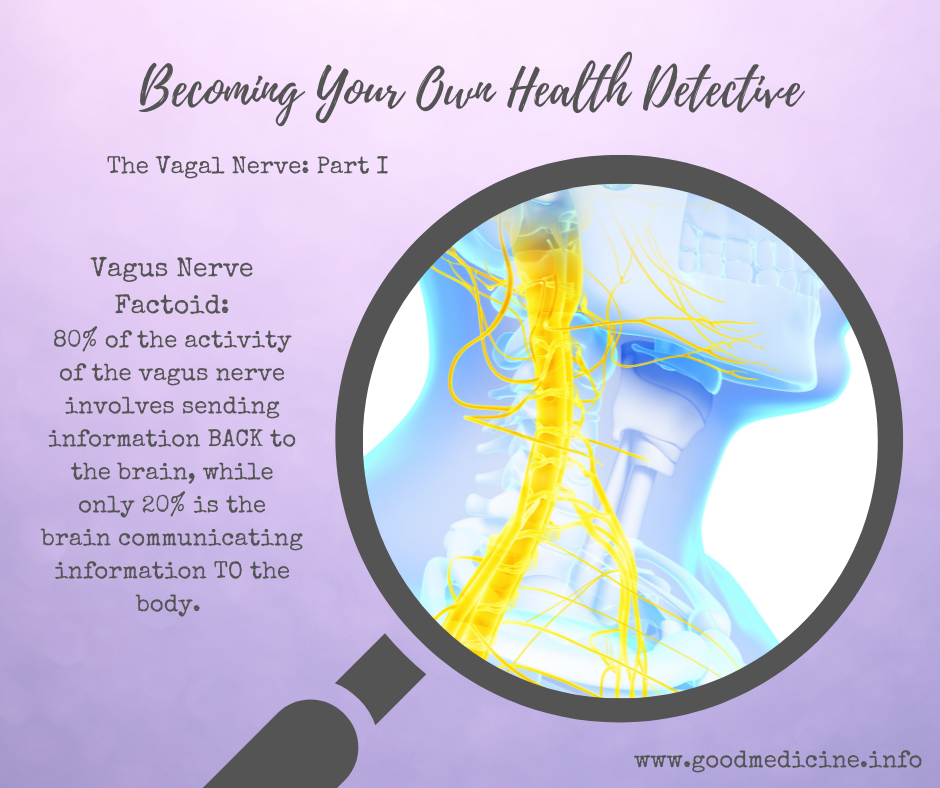A policeman is on the trail of a very successful serial robber. Using the clues🔎 left behind at each crime scene, he finally identifies the robber and apprehends him. The only problem is that the robberies don’t stop, and they look strikingly similar to the original set of robberies. Now the policeman believes one of two things…… a copycat thief has emerged, or the original robber was actually working under the direction of a kingpin, and he was only one of the minions leaving the clues 🔎behind at each crime scene. The original robber isn’t talking, so the policeman must continue his investigation.
👆Sometimes that’s exactly what being a health detective can feel like!
Every body system affects the others, and clues that are viewed as “the problem” may be just one identifiable member affecting the health “crime scene”. Or perhaps, like the copycat robber, the clue (ex: anxiety) has more than one root cause to identify and correct.
Chronic stress may have seemed rather innocent until the truth of its ability to damage the body was unpacked in the last topic discussion. It is a kingpin. Another kingpin in the body is the state of health of the vagus nerve and there are a myriad of clues associated with this VIP portion of the nervous system.
The vagus nerve is the longest cranial nerve, extending from the brainstem to the colon. It is responsible for the “rest and digest” activity of the heart, lungs, and digestive tract, with quite a few additional responsibilities added in for good measure. Some of its major contributing functions include:
⭐️Regulation of appetite
⭐️Control of bowel movements
⭐️Regulating heart rhythm
⭐️Stimulating gastric juice production
⭐️Regulating sweating
⭐️Regulating breathing
⭐️Controlling inflammation response
⭐️Encouraging testosterone production
⭐️Stimulating growth hormone (In adults, this is important for retaining muscle mass, strength, prevention of osteoporosis, concentration, preventing memory loss, and even slowing balding)
⭐️Regulating mood and emotions
⭐️Promoting healthy kidney and bladder function
⭐️Lowering and controlling blood sugar concentrations
⭐️Triggering the release of melatonin
⭐️Stimulating the body’s relaxation response allowing a more rapid recovery from stress, injury, or illness
⭐️Encouraging the storage of strong memories in the amygdala (which is essential for bonding and connecting with others relationally)
The vagus nerve also sends sensory information (on what we see, feel, taste, and hear) to the brain, and is intimately involved as a courier of information allowing the microbiome (the gut bacteria) to directly communicate with the brain. You might have heard of this referred to as the gut brain axis. This is extremely important because many of our neurotransmitters (especially serotonin and oxytocin…. two that contribute to the state of happiness) are directly affected by this feedback.
Having a low or poor vagal tone has a profound effect on the body. Clues pointing to possible vagus nerve dysfunction include:
🔎IBS, Ulcerative colitis, and Crohn’s Disease
🔎Obesity, weight gain or weight loss
🔎Chronic fatigue
🔎Depression
🔎Irregular heartbeat (both too fast or too slow)
🔎Stomach ulcers
🔎Chronic inflammation
🔎Gastroparesis (slowed movement of food from the stomach to the small intestine)
🔎Difficulty speaking, hoarse, or wheezy voice
🔎Pain in the ear
🔎Unusual heart rate
🔎Loss of gag reflex
🔎Chronic abdominal bloating or pain, nausea or vomiting
🔎Anxiety
🔎Brain fog
🔎Dizziness
🔎Frequent headaches / migraines
🔎Insomnia
🔎Frequent urination
🔎Poor glucose control
🔎Food sensitivities
🔎Chronic feelings of disconnectedness or loneliness (Interesting, right? )
Common Causes of vagus nerve damage include:
🔥Chronic alcohol abuse
🔥Chronic stress / anxiety (Please revisit the information on ways to combat stress effectively!)
🔥Braces or extensive dental work (Revisit the post on the effect teeth have on the entire body)
🔥Posture (Revisit the clues related to posture.)
🔥Complications resulting from surgeries (especially those affecting the small intestine or stomach)
🔥Viral infections which are upper respiratory system focused
🔥Aging
🔥Botox injections
🔥Heavy metal toxicity (Heavy metals can be found in tooth fillings, vaccines, environmental contaminants, and even makeup. Young Living’s Savvy Minerals is a safe, beautiful and clean alternative! )
🔥Certain medications that affect the nervous system, including opioids, stimulants (ex: ADHD medications), immunosuppressants, sedatives, and many other prescription and OTC drugs. This is one more reason to identify and incorporate lifestyle changes whenever possible to avoid chronic drug use. Every single medication exerts a negative effect outside its intended target.
The vagus nerve is a key player in living a life of resiliency.🙌 It will come as no surprise that people with high vagal tone have lower incidence of diabetes, strokes, and cardiovascular diseases. They also tend to find it easier to relax😴 after stressful situations, are physiologically 💪stronger, happier, more empathetic, better able to concentrate and remember, and are more likely to have close relationships with others👫. Vagal tone is kind of a big deal! Luckily for all of us, there are some really fun and practical ways to show the vagus nerve a little extra TLC on the regular.
Test your gag reflex sometime soon. (Use a spoon handle and gently tickle the back of the throat on both sides. If you don’t have a gag response to the spoon handle, you’ve got some work to do😉!).
Next week I’ll cover simple ways to incorporate vagal TLC techniques into daily life. It’s important to keep the vagal nerve happy and healthy!
xoxo~ liz
www.goodmedicine.info
#sharingiscaring
#caringforyourvagusnerveisgoodmedicine
#healthdetective
#goodmedicine
#thanksYL

